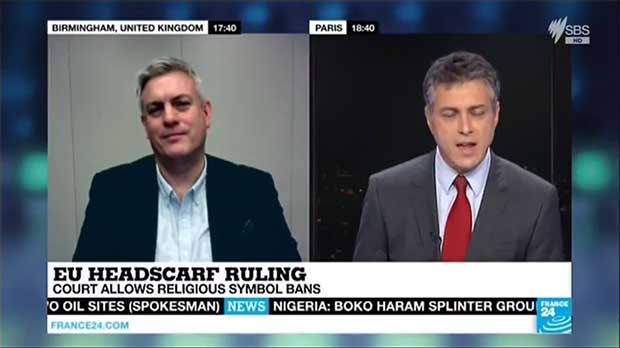This week I became “Mr Headscarf” and, up until Friday mid-morning, it was the most enormous fun. Thanks to a frightfully efficient member of our communications team, we were the first to go public with comment on the Achbita and Bougnaoui cases. I didn’t say anything particularly original or, I thought, interesting: words to the effect that this didn’t make much difference to the existing position in the UK.
However, my rather bland comments got picked up all over the place: BBC, Reuters, The Independent, The Daily Express, The Daily Mail, The Evening Standard etc. They are still being picked up now.
Then the broadcast requests started coming in. I was interviewed live on the World Service, Radio London, France 24 and the Voice of Islam. I was approached by BBC World and Al Jazeera but alas could do neither. Get me.
My evident enjoyment of the whole thing comes across mostly clearly in the France 24 clip. Looking at it now, there is more than a hint of smugness.

That is unfortunate. Because the real story here is not the Courts ruling; it is the reaction to it.
I remain of the view that it will make little difference in the short or long-term to the right – and, in most cases, it is a right – of people to wear symbols of their religious affiliation in their workplace in the UK. I don’t know if that will follow on within mainland Europe: countries there have very different traditions and views on secularism. However, in dear old Blighty, we shall muddle through in our usual tolerant way.
I wasn’t alarmed, just a bit annoyed that the story seemed to be ‘Court rules it lawful to ban headscarves’ because that clearly wasn’t the case. When that became apparent, the fuss would all die down.
Perhaps only a middle-aged and relatively wealthy white-man could be so confident.
I should have picked it up from the radio interviews where other callers were either lamenting or celebrating the rulings as attacks on religious expression. I should have picked it up from the headlines to the pieces in which I was quoted, or at the very least from the comments posting underneath. The penny didn’t really drop though until I was discussing the ruling this morning with a longstanding colleague in the firm (but in another team) who has always worn a hijab in the office. We’d bumped into each other in the canteen. She completely understood the legal position, indeed every nuance. However, her concern was that practices in continental Europe, particularly France, could spread to the UK. Would she continue to be “allowed” to wear the hijab? Would her children? This is a deeply valued symbol of her faith and her frustration was evident.
She had picked up on what other commentators, both learned and not-so-much, had seized on, which is the Court’s rather clumsy expression of a neutral workplace as being a legitimate aim in itself, which is to say the employer can have as a goal for customer-facing employees that no manifestations of religious or other belief be visible.
The English lawyer – the white, middle-aged Partner – is relaxed about this because that legitimate aim still has to be achieved by proportionate means. The judgement cites Eweida with approval. Is the neutrality of the customer experience realistically impaired by the wearing of a cross or the hijab: clearly not: what’s the problem?
However, by elevating “neutrality” to a legitimate aim in itself, as opposed to an aim of (say) a uniform by which customers can easily identify the employer’s personnel, the Court has set a rather worrisome cat amongst the pigeons. The haters are pointing at it gleefully: those they hate are worried. What might this mean?
In my TV commentary, I did recognise (smugly, as I say) that France with its longstanding tradition of secularism may interpret this ruling differently from my own dearly-beloved, woolly-liberal, loosely-Anglican island. I assured my colleague that different, more inclusive values ran deep both in the English legal system and the HR profession; that whatever France or any other EU country did with this ruling, the position here would not change. I really, really hope I am right.
In this workplace, I take those values for granted and in one sense that is good. However, I should be astonished that the events of the last 12 months still on some level haven’t shaken me out of my complacency. The liberal battle-cry – that the one thing we will not tolerate is intolerance – must ring out of me ever fiercer, ever louder. There will be no headscarf ban, not in this building, not in this country, not in this or any generation. That is right and no other interpretation of the law can be allowed to stand unchallenged.
About the author(s)
Jonathan Chamberlain leads for the Technology Sector in Gowling WLG's UK Employment, Labour & Equalities Team. He is a member and past Chair of the Legislative & Policy Committee of the Employment Lawyers' Association, but blogs in a personal capacity.

